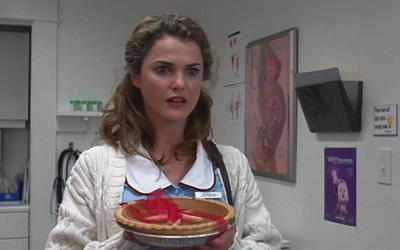Adrienne Shelly’s Waitress is an incongruously cheerful, hopeful film about domestic violence, emotional abuse, poverty, and pie. Keri Russell plays a Communist spy undercover as a small town waitress. She works in a pie diner, baking and serving customers, and she goes home every night to her wheedling, extracting, abusive husband (Jeremy Sisto). Sisto’s Earl is a revelation in how bad cinematic husbands can get, the only character I’ve ever seen to rival John Cassavettes’s Guy Woodhouse, the man who sold his wife to the devil to for a bump in his acting career. What makes Earl so awful isn’t just that he hits Jenna or demands her money, it’s that he’s constantly poking and prodding her for her total emotional engagement. Can she repeat back the exact words he used when complaining about his boss? Can she promise not to love their new baby more than him? She didn’t really sound that excited to see him, can she kiss him like she means it? Years before men urging women to smile started getting widely acknowledged as obnoxious, Waitress provides a completely believable character who makes that demand every minute of the day. No wonder Russell’s Jenna is exhausted.
When she finds out she’s pregnant–“I do stupid things when I’m drunk, like sleep with my husband”–she wearily accepts the situation. She doesn’t plan on an abortion–the film is set somewhere in the South, and feels very culturally of it–but doesn’t want to keep getting congratulations. She makes a secret doctor’s appointment and plans to keep the news to herself, hoping she can sneak away from Earl before she starts to show. What she doesn’t expect is that her new doctor will be a shy, awkward Nathan Fillion. An affair ensues.
Waitress handles affairs in a nicely nuanced way. Jenna’s affair with Dr. Pomatter gives her a much-needed spark of happiness–the long sequence where she gives into her feelings and starts smiling more and more widely in all kinds of settings while Cake’s “Short Skirt/Long Jacket” pumps in the background feels like a genuine victory. Their connection with each other is fraught but genuine. But at the same time, while she might have a terrible husband, he has a loving wife, who could get horribly hurt. Another extramarital affair happens largely in the background, and again, there’s the knowledge that people could get hurt. But there are advantages, too, especially in the lonely, stunted lives the characters lead. As one of them puts it, “I love having someone to look pretty for. I love waking up and having something to look forward to. Something fun and sneaky and sexy… it’s fun.”
Not as simple or as wholesome as pie. But it’s hard to reject happiness, especially when it’s so sorely needed. The film’s thesis seems summed up best not by Jenna but by her boss, the surly Cal (Lew Temple): “Well, if you’re asking me a serious question, I’ll tell you: I’m happy enough. I don’t expect much, don’t give much, don’t get much. I generally enjoy whatever comes up. That’s my truth, summed up for your feminine judgment. I’m happy enough.”
Waitress is about how to get to “happy enough”–and what you need to jettison and what you need to keep in order to stay there. It’s full of compromises and settling, mistakes and no-win scenarios, and making do, from Shelly’s Dawn marrying a man she first thought was a joke to Andy Griffith’s Old Joe trying to point Jenna towards the fresh start he can no longer have. It also offers the timeless message that things are better with pie–a good enough way on its own of getting to happy enough.


